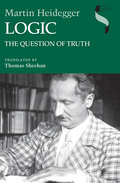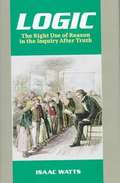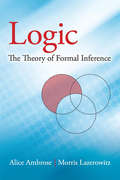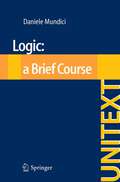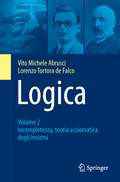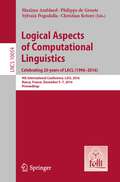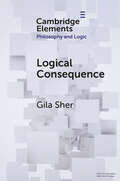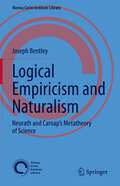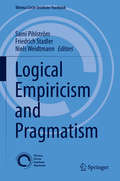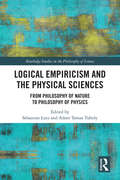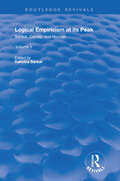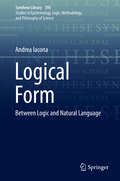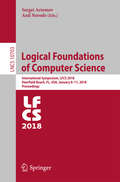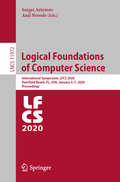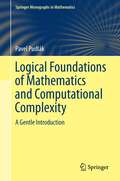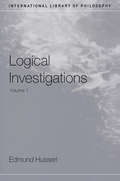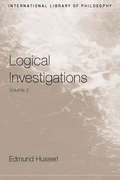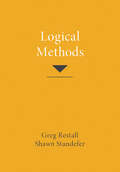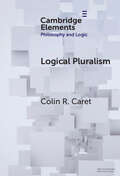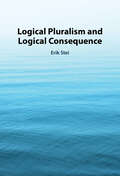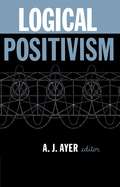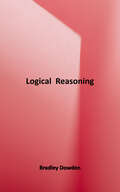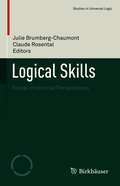- Table View
- List View
Logic: The Question of Truth (Studies in Continental Thought)
by Martin HeideggerHeidegger&’s radical thinking on the meaning of truth in a &“clear and comprehensive critical edition&” (Philosophy in Review). Martin Heidegger&’s 1925–26 lectures on truth and time provided much of the basis for his momentous work, Being and Time. Not published until 1976—three months before Heidegger&’s death—as volume 21 of his Complete Works, it is nonetheless central to Heidegger&’s overall project of reinterpreting Western thought in terms of time and truth. The text shows the degree to which Aristotle underlies Heidegger&’s hermeneutical theory of meaning. It also contains Heidegger&’s first published critique of Husserl and takes major steps toward establishing the temporal bases of logic and truth. Thomas Sheehan&’s elegant and insightful translation offers English-speaking readers access to this fundamental text for the first time.
Logic: The Right Use of Reason in the Inquiry After Truth
by Isaac WattsAs a child of Puritan parents, it is not surprising that Isaac Watts was greatly concerned about people s ability to think clearly. Whether a man was studying for the ministry or any other of the sciences, the ability to reason rightly was of utmost importance. Watts s work on logic and reason became a standard textbook for nearly 200 years, being used in such schools as Oxford, Cambridge, Harvard, and Yale. In Logic, Watts address proper thinking under the four basic functions of the human mind: perception, judgment, reasoning, and disposition. In part one, Watts addresses human perception, the cultivation of ideas, and how we associate them with words. In part two, Watts treats human judgment and its ability to construct various kinds of propositions, while giving guidance for avoiding the formation of bad judgments. Part three covers our ability to reason, giving instruction on the use of syllogisms for constructing a good argument. Part four discusses the mind s disposition as a method of arranging our thoughts for better understanding and memory. This book will help discipline the mind and train the reader to discern proper thinking and argumentation in seeking truth.
Logic: The Theory of Formal Inference
by Morris Lazerowitz Alice AmbroseGeared toward college undergraduates new to the subject, this concise introduction to formal logic was written by Alice Ambrose and Morris Lazerowitz, a pair of noted scholars and prolific authors in this field. A preliminary section opens the subject under the heading of truth-functions. Two subsequent parts on quantification and classes, each subdivided into numerous brief specifics, complete the overview. Suitable for students of philosophy as well as mathematics, the three-part treatment begins with the intuitive development of the standard theory of sentential connectives (called "operators"). The theory is further developed with the assistance of truth-tables and ultimately as a logistic system. Part II explores first-order quantification theory. In addition to examining most of the familiar laws that can be expressed by monadic formulas, the text addresses polyadic principles and the theories of identity and descriptions. Part III focuses on elementary concepts of classes, from class membership and class inclusion to the algebra of classes. Each part concludes with a series of exercises.
Logic: a Brief Course
by Daniele MundiciThis short book, geared towards undergraduate students of computer science and mathematics, is specifically designed for a first course in mathematical logic. A proof of Gödel's completeness theorem and its main consequences is given using Robinson's completeness theorem and Gödel's compactness theorem for propositional logic. The reader will familiarize himself with many basic ideas and artifacts of mathematical logic: a non-ambiguous syntax, logical equivalence and consequence relation, the Davis-Putnam procedure, Tarski semantics, Herbrand models, the axioms of identity, Skolem normal forms, nonstandard models and, interestingly enough, proofs and refutations viewed as graphic objects. The mathematical prerequisites are minimal: the book is accessible to anybody having some familiarity with proofs by induction. Many exercises on the relationship between natural language and formal proofs make the book also interesting to a wide range of students of philosophy and linguistics.
Logica: Volume 2 - Incompletezza, teoria assiomatica degli insiemi (UNITEXT #111)
by Vito Michele Abrusci Lorenzo Tortora de FalcoL'opera si propone come testo di riferimento per acquisire una solida preparazione specialistica nella Logica, presentando in maniera rigorosa ed innovativa argomenti tradizionalmente affrontati nei corsi universitari di secondo livello. Questo secondo volume, che completa l'opera, presenta le basi della teoria della ricorsività, l'aritmetica di Peano ed i teoremi di incompletezza, gli assiomi della teoria assiomatica degli insiemi di Zermelo-Fraenkel e la teoria degli ordinali e dei cardinali che ne deriva.
Logical Aspects of Computational Linguistics. Celebrating 20 Years of LACL: 9th International Conference, LACL 2016, Nancy, France, December 5-7, 2016, Proceedings (Lecture Notes in Computer Science #10054)
by Sylvain Pogodalla Maxime Amblard Christian Retoré Philippe De GrooteEdited under the auspices of the Association of Logic, Language andInformation (FoLLI), this book constitutes the refereed proceedings ofthe 20th anniversary of the International Conference on LogicalAspects of Computational Linguistics, LACL 2016, held in LORIA Nancy,France, in December 2016. The 19 contributed papers, presentedtogether with 4 invited papers and 6 abstracts, were carefullyreviewed and selected from 38 submissions. The focus of the conferenceis the use of type theoretic, proof theoretic, and model theoreticmethods for describing and formalising natural language syntax,semantics, and pragmatics as well as the implementation of thecorresponding tools.
Logical Consequence (Elements in Philosophy and Logic)
by Gila SherTo understand logic is, first and foremost, to understand logical consequence. This Element provides an in-depth, accessible, up-to-date account of and philosophical insight into the semantic, model-theoretic conception of logical consequence, its Tarskian roots, and its ideas, grounding, and challenges. The topics discussed include: (i) the passage from Tarski's definition of truth (simpliciter) to his definition of logical consequence, (ii) the need for a non-proof-theoretic definition, (iii) the idea of a semantic definition, (iv) the adequacy conditions of preservation of truth, formality, and necessity, (v) the nature, structure, and totality of models, (vi) the logicality problem that threatens the definition of logical consequence (the problem of logical constants), (vii) a general solution to the logicality, formality, and necessity problems/challenges, based on the isomorphism-invariance criterion of logicality, (viii) philosophical background and justification of the isomorphism-invariance criterion, and (ix) major criticisms of the semantic definition and the isomorphism-invariance criterion.
Logical Empiricism and Naturalism: Neurath and Carnap’s Metatheory of Science (Vienna Circle Institute Library)
by Joseph BentleyThis text provides an extensive exploration of the relationship between the thought of Otto Neurath and Rudolf Carnap, providing a new argument for the complementarity of their mature philosophies as part of a collaborative metatheory of science. In arguing that both Neurath and Carnap must be interpreted as proponents of epistemological naturalism, and that their naturalisms rest on shared philosophical ground, it is also demonstrated that the boundaries and possibilities for epistemological naturalism are not as restrictive as Quinean orthodoxy has previously suggested. Both building on and challenging the scholarship of the past four decades, this naturalist reading of Carnap also provides a new interpretation of Carnap’s conception of analyticity, allowing for a refutation of the Quinean argument for the incompatibility of naturalism and the analytic/synthetic distinction. In doing so, the relevance and potential importance of their scientific meta-theory for contemporary questions in the philosophy of science is demonstrated.This text appeals to students and researchers working on Logical Empiricism, Quine, the history of analytic philosophy and the history of philosophy of science, as well as proponents of naturalized epistemology.
Logical Empiricism and Pragmatism
by Friedrich Stadler Sami Pihlström Niels WeidtmannThis book explores the complexity of two philosophical traditions, extending from their origins to the current developments in neopragmatism. Chapters deal with the first encounters of these traditions and beyond, looking at metaphysics and the Vienna circle as well as semantics and the principle of tolerance. There is a general consensus that North-American (neo-)pragmatism and European Logical Empiricism were converging philosophical traditions, especially after the forced migration of the European Philosophers. But readers will discover a pluralist image of this relation and interaction with an obvious family resemblance. This work clarifies and specifies the common features and differences of these currents since the beginning of their mutual scientific communication in the 19th century. The book draws on collaboration between authors and philosophers from Vienna, T#65533;bingen, and Helsinki, and their networks. It will appeal to philosophers, scholars in the history of philosophy, philosophers of science, pragmatists and beyond.
Logical Empiricism and the Physical Sciences: From Philosophy of Nature to Philosophy of Physics (Routledge Studies in the Philosophy of Science)
by Sebastian Lutz; Adam Tamas TubolyThis volume has two primary aims: to trace the traditions and changes in methods, concepts, and ideas that brought forth the logical empiricists’ philosophy of physics and to present and analyze the logical empiricists’ various and occasionally contrary ideas about the physical sciences and their philosophical relevance. These original chapters discuss these developments in their original contexts and social and institutional environments, thus showing the various fruitful conceptions and philosophies behind the history of 20th-century philosophy of science. Logical Empiricism and the Natural Sciences is divided into three thematic sections. Part I surveys the influences on logical empiricism’s philosophy of science and physics. It features chapters on Maxwell’s role in the worldview of logical empiricism, on Reichenbach’s account of objectivity, on the impact of Poincaré on Neurath’s early views on scientific method, Frank’s exchanges with Einstein about philosophy of physics, and on the forgotten role of Kurt Grelling. Part II focuses on specific physical theories, including Carnap’s and Reichenbach’s positions on Einstein’s theory of general relativity, Reichenbach’s critique of unified field theory, and the logical empiricists’ reactions to quantum mechanics. The third and final group of chapters widens the scope to philosophy of science and physics in general. It includes contributions on von Mises’ frequentism; Frank’s account of concept formation and confirmation; and the interrelations between Nagel’s, Feigl’s, and Hempel’s versions of logical empiricism. This book offers a comprehensive account of the logical empiricists’ philosophy of physics. It is a valuable resource for researchers interested in the history and philosophy of science, philosophy of physics, and the history of analytic philosophy.
Logical Empiricism at Its Peak: Schlick, Carnap, and Neurath (Science And Philosophy In The Twentieth Century: Basic Works Of Logical Empiricism Ser. #2)
by Sahotra Sarkar Rudolf Carnap Maria Neurath Moritz SchlickFirst Published in 1996. This volume reprints pieces from the Vienna Circle period between the manifesto and the adoption of semantics, as well as two commentaries. During this period, the logical empiricists were the most ambitious and the most confident about the success of their enterprise. The first section consists of four ideological classics, The second section reprints three papers on physicalism. The third section consists of three papers on logic and the fourth on reprints three papers on truth, induction, and confirmation.
Logical Fictions in Medieval Literature and Philosophy
by Virginie GreeneIn the twelfth and thirteenth centuries, new ways of storytelling and inventing fictions appeared in the French-speaking areas of Europe. This new art still influences our global culture of fiction. Virginie Greene explores the relationship between fiction and the development of neo-Aristotelian logic during this period through a close examination of seminal literary and philosophical texts by major medieval authors, such as Anselm of Canterbury, Abélard, and Chrétien de Troyes. This study of Old French logical fictions encourages a broader theoretical reflection about fiction as a universal human trait and a defining element of the history of Western philosophy and literature. Additional close readings of classical Greek philosophers Plato and Aristotle, and modern analytic philosophy including the work of Bertrand Russell and Rudolf Carnap, demonstrate peculiar traits of Western rationalism and expose its ambivalent relationship to fiction.
Logical Form: Between Logic and Natural Language (Synthese Library #393)
by Andrea IaconaLogical form has always been a prime concern for philosophers belonging to the analytic tradition. For at least one century, the study of logical form has been widely adopted as a method of investigation, relying on its capacity to reveal the structure of thoughts or the constitution of facts. This book focuses on the very idea of logical form, which is directly relevant to any principled reflection on that method. Its central thesis is that there is no such thing as a correct answer to the question of what is logical form: two significantly different notions of logical form are needed to fulfill two major theoretical roles that pertain respectively to logic and to semantics. This thesis has a negative and a positive side. The negative side is that a deeply rooted presumption about logical form turns out to be overly optimistic: there is no unique notion of logical form that can play both roles. The positive side is that the distinction between two notions of logical form, once properly spelled out, sheds light on some fundamental issues concerning the relation between logic and language.
Logical Foundations of Computer Science
by Sergei Artemov Anil NerodeThis book constitutes the refereed proceedings of the International Symposium on Logical Foundations of Computer Science, LFCS 2007, held in New York, NY, USA in June 2007. The volume presents 36 revised refereed papers that address all current aspects of logic in computer science.
Logical Foundations of Computer Science: International Symposium, LFCS 2020, Deerfield Beach, FL, USA, January 4–7, 2020, Proceedings (Lecture Notes in Computer Science #11972)
by Sergei Artemov Anil NerodeThis book constitutes the refereed proceedings of the International Symposium on Logical Foundations of Computer Science, LFCS 2020, held in Deerfield Beach, FL, USA, in January 2020. The 17 revised full papers were carefully reviewed and selected from 30 submissions. The scope of the Symposium is broad and includes constructive mathematics and type theory; homotopy type theory; logic, automata, and automatic structures; computability and randomness; logical foundations of programming; logical aspects of computational complexity; parameterized complexity; logic programming and constraints; automated deduction and interactive theorem proving; logical methods in protocol and program verification; logical methods in program specification and extraction; domain theory logics; logical foundations of database theory; equational logic and term rewriting; lambda and combinatory calculi; categorical logic and topological semantics; linear logic; epistemic and temporal logics; intelligent and multiple-agent system logics; logics of proof and justification; non-monotonic reasoning; logic in game theory and social software; logic of hybrid systems; distributed system logics; mathematical fuzzy logic; system design logics; other logics in computer science.
Logical Foundations of Mathematics and Computational Complexity
by Pavel PudlákThe two main themes of this book, logic and complexity, are both essential for understanding the main problems about the foundations of mathematics. Logical Foundations of Mathematics and Computational Complexity covers a broad spectrum of results in logic and set theory that are relevant to the foundations, as well as the results in computational complexity and the interdisciplinary area of proof complexity. The author presents his ideas on how these areas are connected, what are the most fundamental problems and how they should be approached. In particular, he argues that complexity is as important for foundations as are the more traditional concepts of computability and provability. Emphasis is on explaining the essence of concepts and the ideas of proofs, rather than presenting precise formal statements and full proofs. Each section starts with concepts and results easily explained, and gradually proceeds to more difficult ones. The notes after each section present some formal definitions, theorems and proofs. Logical Foundations of Mathematics and Computational Complexity is aimed at graduate students of all fields of mathematics who are interested in logic, complexity and foundations. It will also be of interest for both physicists and philosophers who are curious to learn the basics of logic and complexity theory.
Logical Investigations Volume 1 (International Library of Philosophy)
by Dermot Moran Edmund HusserlEdmund Husserl is the founder of phenomenology and the Logical Investigations is his most famous work. It had a decisive impact on twentieth century philosophy and is one of few works to have influenced both continental and analytic philosophy.This is the first time both volumes have been available in paperback. They include a new introduction by Dermot Moran, placing the Investigations in historical context and bringing out their contemporary philosophical importance.These editions include a new preface by Sir Michael Dummett.
Logical Investigations Volume 2 (International Library of Philosophy)
by Edmund HusserlEdmund Husserl is the founder of phenomenology and the Logical Investigations is his most famous work. It had a decisive impact on twentieth century philosophy and is one of few works to have influenced both continental and analytic philosophy.This is the first time both volumes have been available in paperback. They include a new introduction by Dermot Moran, placing the Investigations in historical context and bringing out their contemporary philosophical importance.These editions include a new preface by Sir Michael Dummett.
Logical Methods
by Greg Restall Shawn StandeferAn accessible introduction to philosophical logic, suitable for undergraduate courses and above.Rigorous yet accessible, Logical Methods introduces logical tools used in philosophy—including proofs, models, modal logics, meta-theory, two-dimensional logics, and quantification—for philosophy students at the undergraduate level and above. The approach developed by Greg Restall and Shawn Standefer is distinct from other texts because it presents proof construction on equal footing with model building and emphasizes connections to other areas of philosophy as the tools are developed. Throughout, the material draws on a broad range of examples to show readers how to develop and master tools of proofs and models for propositional, modal, and predicate logic; to construct and analyze arguments and to find their structure; to build counterexamples; to understand the broad sweep of formal logic&’s development in the twentieth and twenty-first centuries; and to grasp key concepts used again and again in philosophy. This text is essential to philosophy curricula, regardless of specialization, and will also find wide use in mathematics and computer science programs. Features:An accessible introduction to proof theory for readers with no background in logicCovers proofs, models, modal logics, meta-theory, two-dimensional logics, quantification, and many other topicsProvides tools and techniques of particular interest to philosophers and philosophical logiciansFeatures short summaries of key concepts and skills at the end of each chapterOffers chapter-by-chapter exercises in two categories: basic, designed to reinforce important ideas; and challenge, designed to push students&’ understanding and developing skills in new directions
Logical Modalities from Aristotle to Carnap
by Max CresswellInterest in the metaphysics and logic of possible worlds goes back at least as far as Aristotle, but few books address the history of these important concepts. This volume offers new essays on the theories about the logical modalities (necessity and possibility) held by leading philosophers from Aristotle in ancient Greece to Rudolf Carnap in the twentieth century. The story begins with an illuminating discussion of Aristotle's views on the connection between logic and metaphysics, continues through the Stoic and mediaeval (including Arabic) traditions, and then moves to the early modern period with particular attention to Locke and Leibniz. The views of Kant, Peirce, C. I. Lewis and Carnap complete the volume. Many of the essays illuminate the connection between the historical figures studied, and recent or current work in the philosophy of modality. The result is a rich and wide-ranging picture of the history of the logical modalities.
Logical Pluralism (Elements in Philosophy and Logic)
by Colin R. CaretLogical pluralism is the view that there is more than one correct logic. This view emerged in a dialectical context in which certain laws of logic were hotly debated by philosophers. For example, philosophers have spilled a great deal of ink over the logical principle of explosion ('from a contradiction, everything follows'). One side in the debate accepts this principle, the other side rejects it. It is exceedingly natural to assume that these rival points of view are incompatible, hence one side of the debate is correct while the other is incorrect. This is logical monism: the view that there is exactly one correct logic. Pluralists argue that the monistic assumption is subtly and surprisingly wrong. According to the pluralist, some logics that appear to be irreconcilable rivals are, in fact, both correct in their own ways. This Element will explain the debate over logical pluralism in an accessible manner.
Logical Pluralism and Logical Consequence
by Erik SteiLogical pluralism is the view that there is more than one correct logic. This is not necessarily a controversial claim but in its most exciting formulations, pluralism extends to logics that have typically been considered rival accounts of logical consequence – to logics, that is, which adopt seemingly contradictory views about basic logical laws or arguments. The logical pluralist challenges the philosophical orthodoxy that an argument is either deductively valid or invalid by claiming that there is more than one way for an argument to be valid. In this book, Erik Stei defends logical monism, provides a detailed analysis of different possible formulations of logical pluralism, and offers an original account of the plurality of correct logics that incorporates the benefits of both pluralist and monist approaches to logical consequence. His book will be valuable for a range of readers in the philosophy of logic.
Logical Positivism (The Library Of Philosophical Movements)
by A. J. AyerEdited by a leading exponent of the school, this book offers--in the words of the movement's founders--logical positivism's revolutionary theories on meaning and metaphysics, the nature of logic and mathematics, the foundations of knowledge, the content of psychological propositions, ethics, sociology, and the nature of philosophy itself.
Logical Reasoning
by Bradley H. DowdenThis book is designed to engage students' interests and promote their writing abilities while teaching them to think critically and creatively. Dowden takes an activist stance on critical thinking, asking students to create and revise arguments rather than simply recognizing and criticizing them. His book emphasizes inductive reasoning and the analysis of individual claims in the beginning, leaving deductive arguments for consideration later in the course.
Logical Skills: Social-Historical Perspectives (Studies in Universal Logic)
by Claude Rosental Julie Brumberg-ChaumontThis contributed volume explores the ways logical skills have been perceived over the course of history. The authors approach the topic from the lenses of philosophy, anthropology, sociology, and history to examine two opposing perceptions of logic: the first as an innate human ability and the second as a skill that can be learned and mastered. Chapters focus on the social and political dynamics of the use of logic throughout history, utilizing case studies and critical analyses.Specific topics covered include:the rise of logical skillsproblems concerning medieval notions of idiocy and rationalitydecolonizing natural logicnatural logic and the course of timeLogical Skills: Social-Historical Perspectives will appeal to undergraduate and graduate students, as well as researchers in the fields of history, sociology, philosophy, and logic. Psychology and colonial studies scholars will also find this volume to be of particular interest.
